- Home
- Elmore Leonard
The Hunted Page 15
The Hunted Read online
Page 15
"What?" Rosen said.
"The guy's breath. All the time he's hanging on me, strangling me to death, he's breathing in m y face with a breath like he'd been eating fuckin g garbage and hadn't brushed his teeth in fiv e months."
"I can't imagine living like that," Rosen said, "doing it every day."
"That time we did a job, I guess," Davis said:
"We brought the NVA officer out and we brought out our dead. That was something you could coun t on. We always brought out our dead."
"You said you were wounded, got a couple of Purple Hearts," Rosen said. "Was one of them o n that patrol?"
"No, it was another time, an emergency extract," Davis said. "This Medevac landed to pick up our wounded and I ran out with a guy over m y shoulder. I got him inside all right, I looked down , there was all this blood pouring out of my leg. I d idn't feel anything at the time or hear anything because of the rotors, all the fucking noise they were making. As the Medevac was rising up, I banged o n the door and yelled at them, "Hey, shit, I'm wounded too! Open up!" Davis shook his head , thinking about it, and had a sip of beer.
"What was the other time?" Rosen said.
"It was practically the same time. We got up in the air and the fucking helicopter was shot down. I h ad my feet caught in something and when we hit I t ore the tendons in the backs of my legs. That wa s my second Heart in about five minutes."
"But you got out."
"I'm here," Davis said.
"And you're worried about what you're gonna do. I mean when you're discharged," Rosen said. "I d on't understand that. All you've been through , situations you've handled, what're you worrie d about?"
"I told you. I don't have a trade. My military occupational specialty is infantry, and I don't think there's much call for infantrymen in civilian life."
"Learning a trade, doing one thing the rest of your life, that's for clucks without imagination,"
Rosen said. "You don't, in the business world, you don't prepare yourself for a certain job and that's it , like a bookkeeper, a tax accountant. You hire thos e people. What you do, you keep your eyes open, yo u use a little imagination seeing how you can fit int o a situation or how you can bend the situatio n around so it fits you. What did I know about rea l estate and the mortgage business? Nothing. But I s aw an opportunity, a chance to get in, talk to th e right people and convince them they should be doing business with me."
"Okay," Davis said. "But I'm not worth a shit at talking to people. They'd see right away I didn't know what I was talking about. I mean if I tried t o fake it, tell them I'm some kind of an expert."
"No, they wouldn't," Rosen said. "It's how you do it, your tone. They're busy thinking about themselves, what hotshots they are. They're thinking what they're gonna say to impress you. If you star t right off, they see you've got confidence, you loo k right at them, you compliment them, bullshit the m a little, they think ah, he's got good judgment, h e must know what he's doing. That's all. Don't b e afraid of people--Christ, I'm telling you not to b e afraid. I mean in a business situation. Don't let people scare you; because nine times out of ten they don't know any more than you do. Or even less.
They got there pushing and shoving, acting, conning, bullshitting. If they had to get by on basic intelligence alone--most of the people I've done business with--they'd be on the street selling Goo d Humors and probably fucking up the change. . . .
How old are you?"
"Thirty-four," Davis said.
"I didn't get into the mortgage business till I was thirty-eight. No, thirty-nine. I didn't even kno w there was such a thing--lining up a shitload o f mortgages and selling them to banks. A hundre d million dollars worth of paper at one percent.
What's that?"
"A million dollars," Davis said.
"You bet it is. A year," Rosen said. "With not an awful lot of overhead, either. Don't worry abou t the type of business, it's all pretty much the same.
Take your time, talk to people, decide what you'd like to do, then start doing it. What I always say is , making the decision's the hard part. All this time, I m ean for three years, I've been thinking I want t o go home, back to the States. Then something lik e this happens, I have to look at my life closely agai n and make a decision. Why do I want to go home?
Or, do I really want to go home? No, it turns out, after I analyze it, I'm happier here than I've eve r been in my life. What do I want to go home for? . . .
You like it here, don't you?"
"Yeah, it's all right. I guess I've had a pretty good time," Davis said.
"Palling around with Kissinger at the King David Hotel, I guess you have," Rosen said. "Tha t reminds me, you never said who it was let the far t that time. Do you know?"
"It was me," Davis said.
"People look at you?"
"A few. There wasn't anything I could do about it, so I didn't do anything. I stood there and looke d back at them."
Rosen liked that. He sat up in his chair and turned to Davis. "See? What do you mean yo u can't handle a situation with people? That's th e whole idea, be natural, be yourself, you can't miss.
Your only problem, as I see it, is making the initial decision. That's why you're here. You know that?"
"That's why I'm where? You mean sitting here?"
"Right. You're afraid to make the decision to go home."
"I'm going home," Davis said. "I just don't know what I'm gonna do."
"Yeah, but this is like delaying it. Also it's a confidence builder, it's something you know how to handle. I couldn't figure it out at first. Why you'd want to risk your neck. What're you getting out o f it? You haven't said anything about money. Now I s ee why you got involved. You're putting off making a decision. You're sticking to what you know as long as you can."
"That's what I'm doing, huh?"
"Take my word," Rosen said. "Also believe me when I say you've got nothing to worry about dealing with people. Forget what I said about bullshitting anybody. In your case, look right at them and play it straight and you'll win. You've got a nic e natural style."
The security man with the green baseball cap and the submachine gun came up to Rashad the nex t morning at about eight-thirty--after he'd spent th e night in the airport--and asked him what he wa s doing here.
Rashad said yeah, he was supposed to meet a friend coming in from Ben Gurion, was suppose d to be yes terday, but shit, he didn't know when hi s friend was gonna get here now. He just had to wait.
He also had to show another security man--d ownstairs in one of the private security booths--h is passport and empty his pockets and explai n again no, he wasn't an Arab, man, he was a Muslim, born in Dalton, Georgia, lived in Detroit, and had never been to any Arab country in his life.
They still watched him. He'd walk over to the Arkia counter and look at the TV screen of arrival s and departures--almost every hour of the day between here and Ben Gurion--and then walk over to the lunch counter and have a cup of coffee and g o look out the window or stand by the stairs goin g down to the lower level and look in the big mirro r mounted on the landing that showed the securit y booths and the departure waiting area.
The arrivals didn't come in through the terminal.
They'd get off the plane, pick up their luggage from the train of baggage carts, and walk through th e gate to the street. At ten o'clock, outside for som e fresh air, watching a group of passengers that ha d just gotten off a plane, Rashad saw a familiar face.
A woman. A nicely dressed woman with a group of women laughing and carrying on, acting like little girls. Americans. Maybe from the Hilton. Or the Pal. He might've seen her in the lobby one time.
Staring at the woman he made himself remember. It wasn't in Tel Aviv, it was Jerusalem. And not in a hotel, but coming out. With the man, Mr.
Rosen. Walking to his car.
All the women were crowded around the entrance of a red-and-white Egged Tour bus while their luggage was being loaded on. Rashad waited.
He was th
e last one to step aboard, jumping in just as the door was about to snap closed. When th e driver looked at him funny, Rashad handed him a ten-pound note.
"You going to the hotel, aren't you?"
The driver nodded.
"I just want a lift, man. I'll stand right here out of the way."
That was how Rashad got to the Laromme on the south beach road and how he came to be hanging around the lobby, watching the woman friend of Mr. Rosen's, when another friend of Mr.
Rosen's, the Israeli chick with the nice ass, Tali, walked up to the woman and started talking to her.
On the phone a few minutes later, when he heard Valenzuela's voice, Rashad said, "You gonna lik e what I got to tell you."
WHAT GENE VALENZUELA LIKED was the view of all the cement work going on.
At half past ten, when the phone rang in the cafe, Valenzuela was on an upper-level terrace not mor e than a half mile from Rashad. The terrace, whic h ran along in front of the cafe in a clean new complex of mini-mall shops and fast-food places, got the sun directly and was hot at midmorning, but i t gave Valenzuela a treeless view of everything. Directly below him, the road came curving in from the south beach and fingered out in three directions: across open, undeveloped land to the North Beach hotels; to the airport; and up the hill to town.
The cement work was done in a hurry; it didn't have a nice finished look. But it was new and clean.
He'd think about the old, gray-peeling cement at Lewisburg (with the highest homicide rate of an y federal prison), hard motherfuckers fighting ove r the queens. He'd watch the Israeli girls walk by i n their jeans with their Jewish asses. There was a crowd of young stuff here and enough cemen t work--a guy with half a dozen transit-mixer s could make enough to retire in three years.
When the phone rang in the cafe he thought of his wife and pictured her talking on the phone i n her smart-ass voice to her mother--"I don't kno w where he is, the sonofabitch. Who knows? He neve r tells me where he goes and I personally don't care."
She'd never find him, either. She'd never even heard of Eilat. Shit, who had? He'd bet Harr y Manza had never heard of it. But if it was a moneymaker, it wouldn't matter to Harry where it was.
Get some development capital from him. Cash.
Sneak it into the country. Nothing signed with him, no written agreements. Harry had to die sometime.
Valenzuela saw himself sitting here with a growing business. Let his wife keep wondering where h e was. Let her bitch and never have to listen to he r again.
On the phone, talking to Rashad, he said, "Okay, stay there. Teddy's due to call or come b y here in about . . . fifteen, twenty minutes. We'l l meet you outside the hotel."
"Israeli girls are funny," Davis was saying to Rosen at ten that morning, in the kitchen having coffee.
"Or maybe all girls are funny, I mean different, and I don't know how to read them."
"It's a knack," Rosen said. "First you've got to never be awed. Though you're polite, of course."
"This girl I picked up one time at the Shalom Tower," Davis said. "We're getting along fine, having a coffee. She says she's meeting her girlfriend from England at the El Al terminal. So we pick he r up, a really good-looking girl with the long blond e hair and the English accent and all, and we go t o the Israeli girl's apartment. She says she's got a bottle of wine there and some hash. So I'm thinking fine, one girl or the other, I can't miss. We get to th e apartment, the Israeli girl's hus band's there. Liste n to this. I end up talking to the husband about th e West Bank situation while the two broads are off i n the bedroom making out."
He was never sure Rosen listened, because Rosen seldom commented. He would start talkin g right away, saying something that didn't alway s follow.
"I learned a long time ago," Rosen said, "the most overrated thing in the world--you kno w what it is?"
"What?"
"Teenage pussy. That young stuff, you say, oh man--they don't even know half the time wha t to do with it. They're thinking about their hair.
Their minds jump around too much. From my experience--you don't have to believe this, but it's true--the best is a younger middle-aged woma n recently divorced or widowed. By recently I mea n within a couple of years. I'll qualify that still further. Naturally she's got to be good-looking and you don't want a real fat one or one that wears a lo t of makeup to hide her age and looks great only i n the Hilton lounge, but after--you know what I m ean. It's true. Good-looking, stylish, middle-age d broads with some background, you know, somebody you can talk to. Otherwise, if all you want's a jump, get a whore, it's cheaper. No, but you se e stylish tourist ladies--you see them all the time a t the King David, the Hilton, the International. Well , the International, I'm not so sure. But which one s do you think'd be better in bed, the tourist ladie s that stay at the King David or the ones that stay a t the Hilton? You've been to the Hilton, haven't you?
In Jerusalem?"
"Yeah, I've been there."
"And you know what the King David looks like."
"Sure."
"Okay, which you think would be better?"
"What's the difference?" Davis said.
"I'll tell you," Rosen said, in the kitchen of the desert house, seated at the table, looking up a t Davis standing by the sink. "The Hilton lady, usually her clothes are more expensive. She spends a little more on herself, her hair, and she's more likel y to wear designer labels. The King David lady is a little plainer on the average, though in very goo d taste. She's quieter and not as easy to meet. Bu t once you get next to her--you know what I meant he King David lady is better in bed. You kno w why?"
"Why?"
"Because usually it's been a longer time since she's had it. She's more grateful and, hence, sh e gives more of herself."
"That's interesting," Davis said.
"It's a fact, based on research," Rosen said.
"Eight out of ten divorced wives of doctors and orthodontists who stay at the King David are better in bed. Make it sound more scientific."
Davis put his cup in the sink. His hand came up and touched the Colt holstered beneath his jacket.
"Well, listen, I'd like to stay and chat with you some more, but I think I better get going."
"You come back," Rosen said, "bring me some Winstons. Hey . . . and my passport."
Rashad had to look for the gray Mercedes; first, standing in the shade of the canopy over the entrance, then seeing he'd have to walk through the aisles of cars. He found it parked down near th e end of a row. The engine was running and the airconditioning was on. Rashad stooped at the window on Teddy's side, looking past Teddy at Valenzuela.
"You see him go in? The Marine?"
"He's in there?" Valenzuela straightened.
"It was good I saw him first. I'm standing in the lobby. I turn around, he's walking over to the desk."
"Yeah? What'd he do?"
"He got in a elevator, went upstairs."
"How long ago was that?"
"Five minutes," Rashad said. "I just seen him. I c ouldn't believe it, I turn around, there he is wit h his cap on."
"But no sign of Rosen, uh?"
"No, I looked around some."
"How about the girl, Tali?"
"She went up before, with the woman."
Valenzuela nodded. "Then the Marine comes and he goes up. Like they have it arranged." Valenzuela was silent a moment. "You didn't see the girl at the airport. Just the woman."
"That's right," Rashad said.
"So she got a ride or she drove his car. We'll look around for it." Valenzuela was silent again. He shrugged. "Then see what happens."
Edie, sitting on the bed, told them the story of how the charter flight had been cancelled yesterday afte r they'd waited around the airport for hours, of the n going back to the Hilton on the tour bus, anothe r hour, and of waiting again while the baggage wa s unloaded and carried up to the room, of then no t having anything to do yesterday afternoon. . . .
Tali sat there patiently. Davis sat
there thinking, Come on, get to the end!
. . . Then this morning doing it all over again, going out to the airport at seven, two hours earlier , waiting some more, going through security, and th e charter finally leaving at ten.
Why is it so important to her? Davis was thinking.
Why didn't she ask about Rosen? She had asked, yes, how he was. But why wouldn't he be the onl y thing on her mind? Tali must have talked to he r yesterday and explained a little of the situation.
Why wasn't she concerned about him? No, people had their own concerns--cancelled flights--tha t were just as important.
He said, "You have his passport?"
"I thought I was going to see him," Edie said, surprised now after all that.
"In case he doesn't get by this way," Davis said.
"I don't know what his plans are."
"Well, if that's the way he wants to be," Edie said. "If he wants to keep on being the myster y man . . ."
Davis looked at Tali as the woman went over to her suitcase and pulled out Rosen's safari jacket.
Tali glanced at him, but her expression told him nothing.
"Tell him we're leaving here tomorrow afternoon at five-thirty," Edie said. "If he wants to call me, I think it would be nice."
"There's no phone where he is," Davis said.
"Maybe you don't understand. He's in a lot of trouble."
Edie came over to hand him the jacket. "Maybe I d on't understand," she said. "According to Tali , some crazy people are trying to kill him. But I kno w he tends to be a little dramatic. The mysteriou s American living in the Middle East. Am I suppose d to believe he's a spy, something like that? I'll sa y one thing, he's entertaining. But I'm afraid I don't have enough motivation or incentive to wai t around while Al Rosen plays his games, or whatever he's doing. If he wants to see me today or tomorrow, fine. If he doesn't, well . . . his passport and sunglasses are in the pocket."
"I'll tell him," Davis said.

 Charlie Martz and Other Stories: The Unpublished Stories
Charlie Martz and Other Stories: The Unpublished Stories Elmore Leonard's Western Roundup #2
Elmore Leonard's Western Roundup #2 Fire in the Hole
Fire in the Hole Tishomingo Blues (2002)
Tishomingo Blues (2002) Djibouti
Djibouti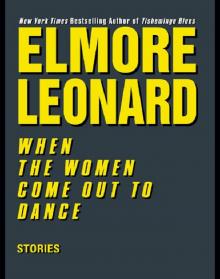 When the Women Come Out to Dance: Stories
When the Women Come Out to Dance: Stories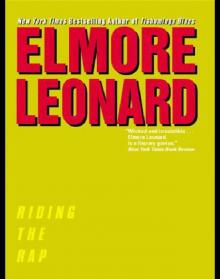 Riding the Rap
Riding the Rap Moment of Vengeance and Other Stories
Moment of Vengeance and Other Stories Raylan
Raylan Touch
Touch Mr Majestyk
Mr Majestyk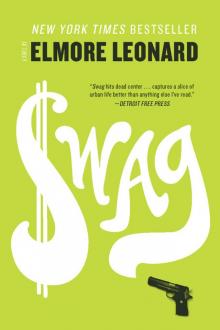 Swag
Swag Road Dogs
Road Dogs La Brava
La Brava The Hot Kid
The Hot Kid Valdez Is Coming: A Novel
Valdez Is Coming: A Novel Be Cool
Be Cool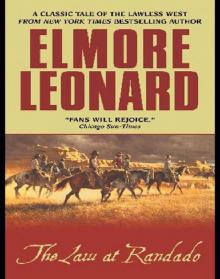 The Law at Randado
The Law at Randado The Bounty Hunters
The Bounty Hunters When the Women Come Out to Dance
When the Women Come Out to Dance 310 to Yuma and Other Stories (1953)
310 to Yuma and Other Stories (1953)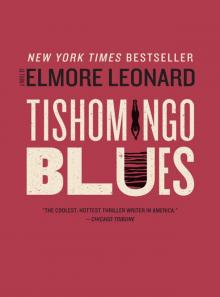 Tishomingo Blues
Tishomingo Blues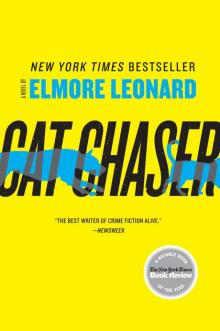 Cat Chaser
Cat Chaser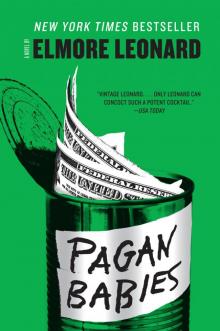 Pagan Babies
Pagan Babies Elmore Leonard's Western Roundup #1
Elmore Leonard's Western Roundup #1 52 Pickup
52 Pickup Stick
Stick The Moonshine War
The Moonshine War Valdez Is Coming
Valdez Is Coming City Primeval
City Primeval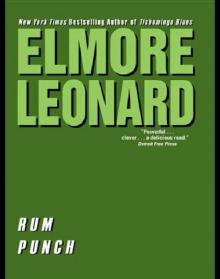 Rum Punch
Rum Punch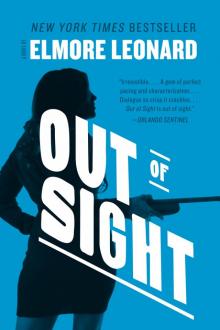 Out of Sight
Out of Sight Naked Came the Manatee (1996)
Naked Came the Manatee (1996) Killshot
Killshot Cuba Libre
Cuba Libre Forty Lashes Less One
Forty Lashes Less One The Complete Western Stories of Elmore Leonard
The Complete Western Stories of Elmore Leonard Pronto
Pronto Split Images
Split Images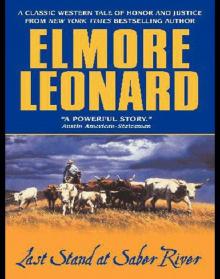 Last Stand at Saber River
Last Stand at Saber River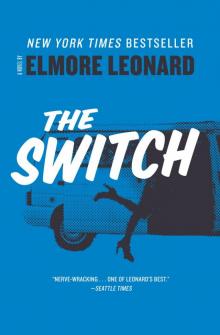 The Switch
The Switch Three-Ten to Yuma and Other Stories
Three-Ten to Yuma and Other Stories Bandits
Bandits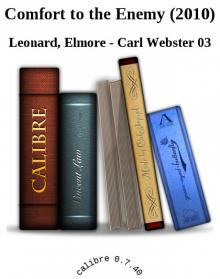 Comfort to the Enemy and Other Carl Webster Stories
Comfort to the Enemy and Other Carl Webster Stories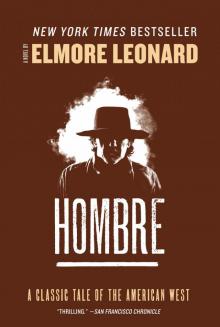 Hombre
Hombre Trail of the Apache and Other Stories
Trail of the Apache and Other Stories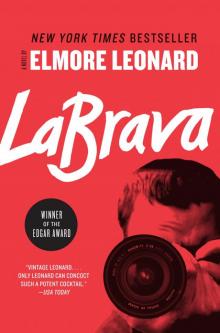 LaBrava
LaBrava Gold Coast
Gold Coast Jackie Brown
Jackie Brown Escape From Five Shadows
Escape From Five Shadows Karen Makes out (1996)
Karen Makes out (1996) Up in Honey's Room
Up in Honey's Room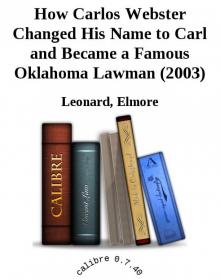 How Carlos Webster Changed His Name to Carl and Became a Famous Oklahoma Lawman (2003)
How Carlos Webster Changed His Name to Carl and Became a Famous Oklahoma Lawman (2003)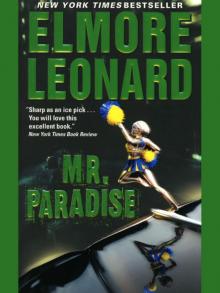 Mr. Paradise
Mr. Paradise The Hunted
The Hunted Freaky Deaky
Freaky Deaky Louly and Pretty Boy (Ss)
Louly and Pretty Boy (Ss)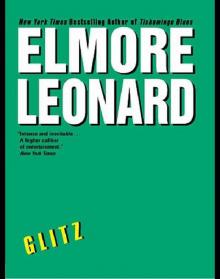 Glitz
Glitz A Coyote's in the House
A Coyote's in the House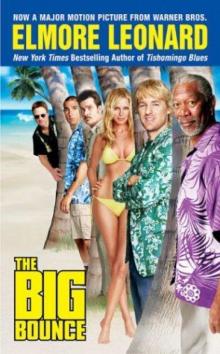 The Big Bounce jr-1
The Big Bounce jr-1 Up in Honey's Room cw-2
Up in Honey's Room cw-2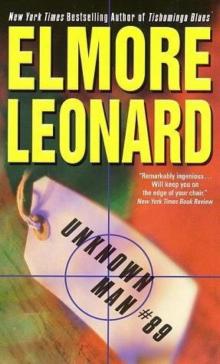 Unknown Man #89 jr-3
Unknown Man #89 jr-3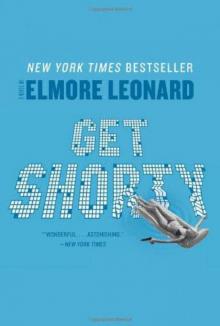 Get Shorty: A Novel cp-1
Get Shorty: A Novel cp-1 Gunsights
Gunsights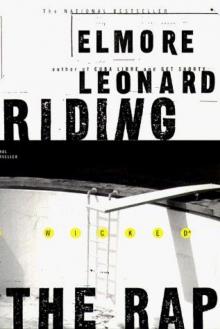 Riding the Rap rg-2
Riding the Rap rg-2